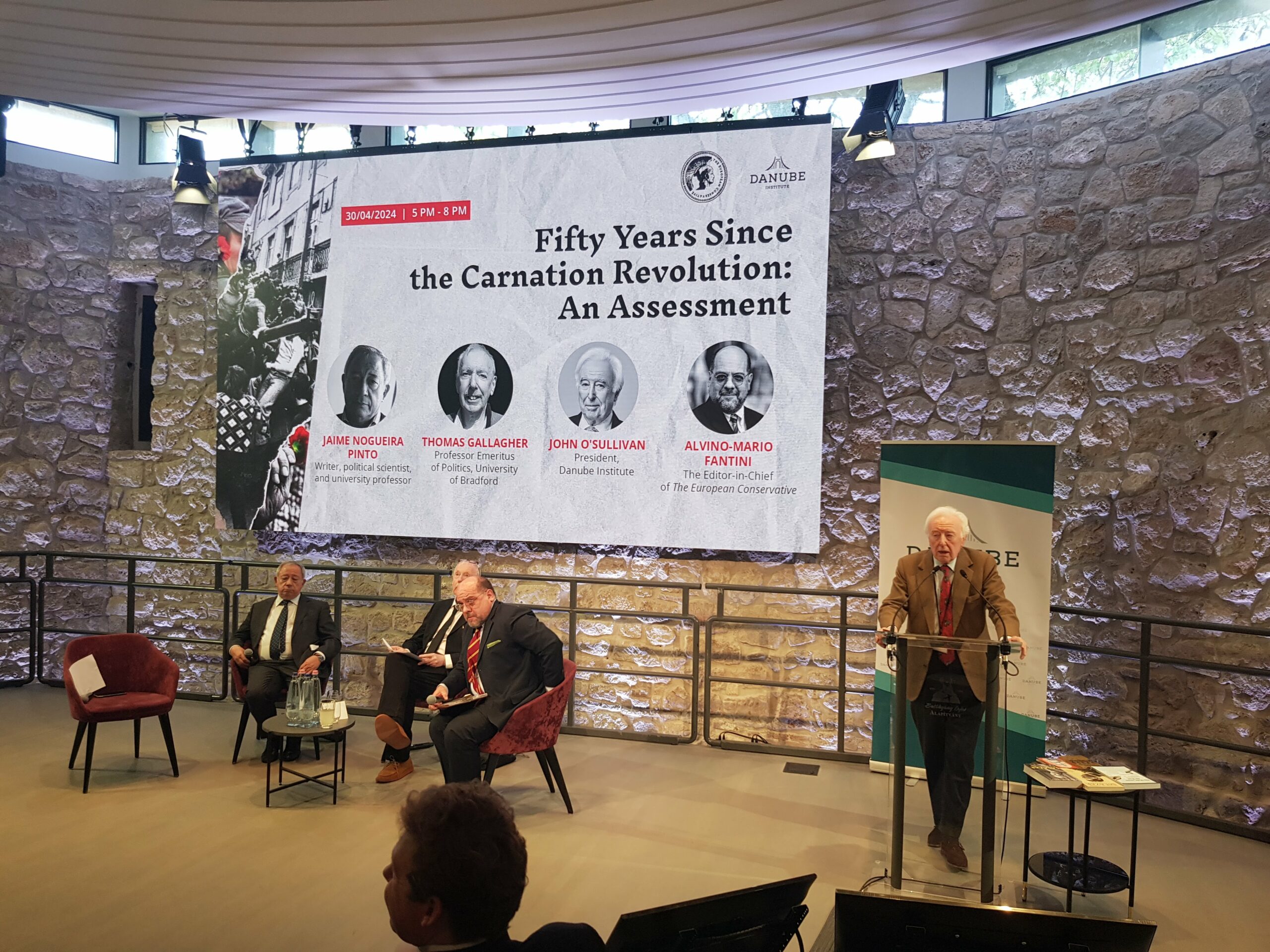
Conducting the History of Portugal Seminar «50 years of the Carnation Revolution: an evaluation
|
Getting your Trinity Audio player ready...
|
On April 30 at the Danube Institute in Budapest, the seminar "50 years of the Carnation Revolution: an evaluation" was held, where the person in charge of the opening was the Director of the institution, John O Sullivan, who mentioned his personal experience with the journalistic coverage of the Carnation Revolution in 1975, as a journalist at The Daily Telegraph, highlighting its historical importance given that this movement sought to overthrow the authoritarian government of General Antonio de Oliveira Salazar, combining historical and romantic elements, with parallels with other European revolutions. The debate arose as to whether the perceptions and justifications of that time were accurate or whether they have been reinterpreted over time.
Then it was the turn of the Editor-in-Chief of the European Conservative, Alvino-Mario Fantini, who assumes the role of moderator and begins by reflecting on his dual perspectives on revolutions, recognizing both their attractiveness and their potential danger, highlighting his personal connection with a past revolution in Bolivia and how this influences his critical vision of the revolutionary processes.
The Anti-Fascist motive is argued during the Portuguese Revolution where it is mentioned that it was constant during the Revolution and debated among commentators, among whom are also Professor Emeritus of Politics at the University of Bradford Thomas Gallagher, about the recent emergence of the conservative Chega party as a fascist threat, this is discarded and more as a possibility of perception more outside of Portugal than inside; the party leader, a former lawyer, is difficult to characterize as authoritarian.
There was discussion about the abandonment of innocent losers in the revolutionary process, people of different racial origins in Portugal were quickly thrown into oblivion by the captains after the Carnation Revolution. There was also debate about the disappearance of promising multiracial societies in Africa, which was a great historical calamity, where current agitators try to subvert democracies in the northern hemisphere (Woke movements and Agenda 2030) while Portugal has successfully avoided serious racial conflicts.
The military role during the revolution is described as a useless vanguard.
where brand new officers projected to be military guardians and defenders of popular power, but this turned out to be incoherent, so much so that among the main reasons for the revolutionary failure was the fratricidal nature of the extreme left and the intense rivalries with mutual hatred between revolutionary parties led to the miserable end of the revolution.

It was the turn of the expert guest, Mr. Jaime Nogueira Pinto, writer, political scientist and university professor. He began by explaining that within the characteristics of the Portuguese Revolution and its Impact on Society, the communists took control of the media and the unions, generating a turbulent period in 1975, in which Portugal continues to maintain a discreet pride to this day, Without a strong revolutionary ideological imprint, in the 80s, Portugal experienced a good economic moment with new infrastructure projects, despite political rivalries, the country has discreetly commemorated its international economic role, but as is customary on the left, The proposal to pay reparations to Brazil for slavery diverted attention from the revolutionary celebration.
It is an undeniable fact that the younger generations did not support the authoritarian regime prior to the revolution, but there is support for a multicultural idea of the Portuguese empire as a reason to maintain it, the late economic effort before the revolution was crucial to maintain Portuguese independence .
Causes and Consequences of the Carnation Revolution in Portugal
Its evolution was not only important for Portugal, but also influenced later events in Central America, specifically in El Salvador and Nicaragua. Despite not having punitive powers, there were effective interventions by external actors that contributed to the establishment of a new democracy in Portugal.
In the case of its contribution to the rise of Eurocommunism The lack of violent communist response during the Revolution paved the way for the rise of Eurocommunism, a movement towards democracy that was echoed in Italy and other European countries, representing an attempt by both the right as on the left to find common ground in the face of the collapse of traditional communism. It flourished temporarily but apparently disappeared after the collapse of traditional communism in Eastern Europe, thus marking a transitory stage in political evolution.
We have already seen that Communism only changed its forms and its revolutionary subjects, those who remain active depending on the reality of the countries where they always stealthily try to take over States no matter what.
At the end of the event we had a camaraderie dinner with different officials from the American, Hungarian, British governments and researchers from the prestigious research center







